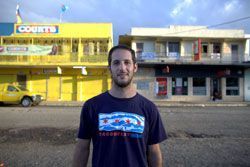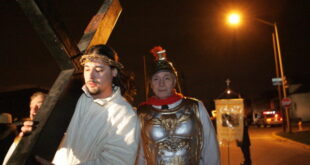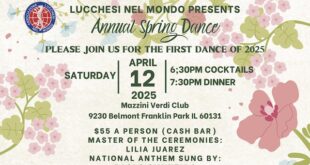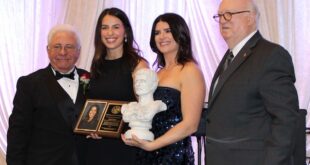
“In the two years we’ve been out here, we’ve experienced a small piece of life in Fiji,” he explains. “I think building relationships with community members is the most important part of the service that the Peace Corps offers, and it’s truly the best way to better understand the culture.”
Fleming arrived in Fiji and was sworn in on July 4, 2011. After roughly seven weeks of training with a host family that include learning the native language, he settled into a community of 400 indigenous Fijians on Viti Levu, the largest of the Fiji Islands.
The Peace Corps has three program sectors that volunteers dedicate their time to. Fleming is currently serving as a health promotion volunteer. “This is typically decided by the host country and the Peace Corps and you don’t always have a lot of input into the projects you get involved with,” he explains.
Life on Viti Levu couldn’t have been more different from the life he left behind in the states.”My house is made of corrugated metal separated into two major rooms with a shower and a flush toilet. That’s a hot commodity!” Fleming says. “I wake up to the roosters crowing and kids yelling ‘Daniela’ (his Fijian name) until I open the door to my tin house, heat up the leftovers from the night before, the kids smell what’s cooking and pile into my house!”
After he gets charged up to greet the day, he runs over to the primary school to visit with more than 100 students. “We discuss anything from beekeeping and organic gardening to first aid and water sanitation and usually finish the day in the school garden before heading back to the grounds to play volleyball and rugby,” he says.
He spends the rest of the day washing his clothes, cleaning his house, strumming his guitar, playing cards with the kids next door or tending to his beloved garden. “Gardening has been my most treasured distraction, and has given me an excess of delicious fruits and vegetables to enjoy,” he enthuses. As the sun sets, the electricity is turned on in the village for about two hours, giving him and everyone else enough time to cook dinner.
The change in lifestyle has been dramatic to say the least, but Fleming has approached it with an open mind. “It took some time getting used to everything running behind schedule, the lack of privacy and the increased attention,” he explains. “But I feel like I have grown (as a result).”
In this laid-back environment, he has learned to take pleasure in the little things. “With one week left on the school break, the kids and I have kept busy shampooing puppies to keep the ticks and fleas under wraps, while discussing animal cruelty and personal hygiene,” Fleming says. “And I never knew there were so many stars in the sky before I came out here.”
His greatest satisfaction can be found in the bonds that he feels with his neighbors, and the progress that he has witnessed. “Seeing a community member take charge and move forward with a project, or watching one of the kids growing veggies for their family, is always satisfying,” he explains. “But understanding and being a part of a community continues to be the highlight of my service.”
Fleming’s Italian family has helped him feel connected to life in America even though he’s so far from home. His brother Matt came to visit him, he Skypes with his Grandma, and his mother has been a constant source of love and support. “My mother has been keeping me alive out here with her famous biscotti that she sends me!” he says.
Fleming will be wrapping up his tour of duty in a few months, and would love to head up to Thailand to visit his stepmother’s family before heading back to Chicago. The hardest part about returning to the states? Re-acclimating to the American job market, according to Fleming. “I can walk out my door and right in to a school and teach without any real experience or training,” he says. “If I can find something that places me in a position as rewarding as this, I’m there!”
 Fra Noi Embrace Your Inner Italian
Fra Noi Embrace Your Inner Italian






